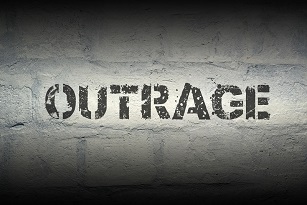A recent study, “Parenthood as a Moral Imperative? Moral Outrage and the Stigmatization of Voluntarily Childfree Women and Men” by Leslie Ashburn-Nardo, has recently received quite a bit of online ink.
The Outrage Result
I elaborate on the study here; briefly – the study had 204 introductory psychology college students randomly read one of four versions of a paragraph about the life of an “alleged former student” after s/he had graduated. They then answered questions that pertained to the alumni’s “psychological fulfillment or adjustment” and the extent to which the alumni made them feel “disapproval, angry, outraged, annoyed and disgusted.”
A heap of online headlines put a big spotlight on one of the findings – that not having children “inspires moral outrage in others.” However, reading the study itself is very informative. Jenna Watling Neal, who was part of a discussion on the study on Facebook makes an astute observation:
“I pulled the actual journal article and even though the moral outrage finding is significant, the actual magnitude of the effect looks pretty tiny. The mean moral outrage for targets [alums referred to in the paragraphs] with no children was 1.37 and the mean moral outrage for targets with children was 1.16 on a 1 to 5 scale where 1 indicates ‘not at all’ outraged and 5 indicates ‘very much.’”
Ashburn-Nardo does acknowledge this in the article: the “mean levels of moral outrage were small overall.” However, many online headlines would make one think the findings were a lot stronger than the study found. As Watling Neal remarks, the findings “are overblown in the media!”
I have seen a fair amount of this online, and contemplate the impacts.
Notching Backward or Forward
Though certainly not the first time headlines overstate research findings, in this case, I wonder how much they will serve to confirm perceptions that the childfree somehow do deserve moral outrage. To what degree does it feed the perpetuation of the pronatalist notion that parenthood is a moral imperative? To the extent it breeds pronatalism dogma, it notches back the progress of social change.
Or, does it ultimately notch progress forward? There is more awareness today than a generation ago that stigmas and misperceptions exist – and shouldn’t – about not having children by choice. For some years now, academics and authors have shined much light on how the childfree are ostracized, criticized and judged. Through blogs, e-publications, and forums, the evolution of our online world has made so much more information accessible, and provided the opportunity for the childfree to find community. Perhaps, as provocateur, exaggerated headlines draw people in to read online pieces, join in discussion, and inspire wanting to learn more, which can ultimately foster even more education about the childfree choice and those who make it.
So do instances of exaggerated headlines notch progress backward or forward? Maybe it does both.
Impact on the Big Picture
Also consider how overstated headlines impact the perception of society’s acceptance of the childfree choice. When the headline reads that being childfree inspires moral outrage, one could easily be led to believe that we are a long ways from society seeing this choice as equally legitimate as the choice to become a parent.
 In 2012, I put out an online poll asking this question: How accepting is society of the childfree choice? Fifty-eight percent of the almost 700 respondents chose this response: It is more accepted today than 10 years ago but we still have a ways to go.
In 2012, I put out an online poll asking this question: How accepting is society of the childfree choice? Fifty-eight percent of the almost 700 respondents chose this response: It is more accepted today than 10 years ago but we still have a ways to go.
From being on the pulse of the childfree choice for 18 years now, I too say, we have a ways to go, and that in the last 40+ years, we have come a long way as well. Today, if you appeared on TV to talk about the childfree choice, it is highly unlikely you would lose your job like Marcia Drut-Davis did in the 70s. The internet continues to serve as a powerful, evolving platform for the childfree to come out of the silent margins. And today, we see much more dialectic on understanding the childfree choice, and how the stigmas, perceptions and judgments need to be questioned. We see more outspokenness about not buying into the stigmas, perceptions and judgments held by previous generations.
Where the Outrage Belongs
Outrage has a place, but not directed at the childfree. Instead, on the road to change, shouldn’t it inspire outrage when:
- a majority in our society values reproductive freedom and rights, yet all too many hold erroneous judgments about the choice not to reproduce?
- societal norms insist on making others so wrong for not wanting one particular life experience?
- society persistently pushes and reinforces reproductive conformity?
These questions point to pronatalist forces that continue to drive too many people’s beliefs, attitudes and behaviors. What should also inspire outrage is the fact that pronatalism, which consists of outmoded and untrue assumptions about reproduction and parenthood, is uncritically followed, and has many negative impacts on all of us.
Yet, I am inspired by the words of Rebecca Solnit, that, “Undoing social frameworks of millennia is not the work of a generation or a few decades but a process of creation and destruction that is epic in scope.” On this important path of undoing, we need to continue to speak out about the wrongful perceptions, criticisms and judgments, and now more than ever, to pronatalism, the behemoth of a force that drives them.






While this suggestion won’t be considered very PC, we are SLOWLY going to evolve to a world where the outrage is at couples who irresponsibly choose to conceive 8, 6, 4, and eventually 3 or even 2 children – knowing what we know today about overpopulation and overshoot. Of course we have a long way to go, and my preference would be to have very few couples to be outraged about.
Excellent point, Dave!
Postscript to this – A related example of when the media continues the spreading of overblown results, this one in Glamour today in the piece, “More Women Are Having Kids in Their 30s Than Their 20s, and That’s Good.” In it there is this, obviously from the previous ink regarding how the study I talk about above that found that childfree “inspire moral outrage”: “Yet a study published in Sex Roles earlier this year found that people continue to consider child-free people less satisfied with their lives and even less moral.” Too bad, they too, did not look a bit closer at the actual results of the study…